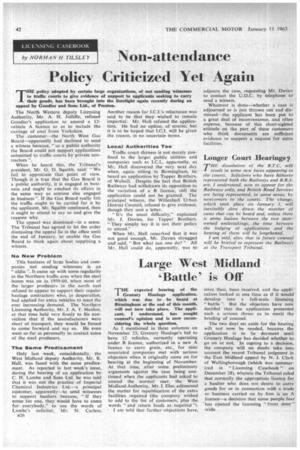Policy Criticized Yet Again
Page 44

If you've noticed an error in this article please click here to report it so we can fix it.
THE policy adopted by certain large organizations, of not sending witnesses to traffic courts to give evidence of support to applicants seeking to carry their goods, has been brought into the limelight again recently during an appeal by Goodier and Sons Ltd., of Preston.
The North Western deputy Licensing Authority, Mr. A. H. Jolliffe, refused Goodier's application to amend a 12vehicle A licence so as to include the carriage of coal from Yorkshire.
The customer—the North West Gas Board—apparently had declined to send a witness because, "as a public authority the Board could not support applications submitted to traffic courts by private contractors".
When he heard this, the Tribunal's president, Mr. G. D. Squibb, said: "We fail to appreciate that point of view. Though it is true that the Gas Board is a public authority, it is engaged in business and ought to conduct its affairs in the same way as anyone else engaged in business ". If the Gas Board really felt the traffic ought to be carried for it by the applicant, Mr. Squibb continued, then it ought to attend to say so and give the reasons why.
The appeal was dismissed—in a sense. The Tribunal has agreed to let the order dismissing the appeal lie in the office until the end of January. to enable the Gas Board to think again about supplying a witness.
No New Problem This business of large bodies and companies not sending witnesses is an " oldie ". It came up with some regularity in the Northern traffic area when the steel boom was on in 1959-60, when most of the larger producers in the north east refused to appear to support their regular haulage contractors who, in desperation, had applied for extra vehicles to meet the ever increasing demand. The Northern Licensing Authority, Mr. J. A. T. Hanlon, at that time held very firmly to his conviction that if the manufacturers were short of transport, they would be forced to come forward and say so. He even went so far as personally to contact some of the steel producers.
The Same Predicament Only last week, coincidentally, the West Midland deputy Authority, Mr. R. Hall, was faced with the same predicament. As reported in last week's issue, during the hearing of an application by C. H. Lambe and Sons Ltd. he was told that it was not the practice of Imperial Chemical Industries Ltd.—a principal customer, apparently—to send witnesses to support hauliers because, "If they come for one, they would have to come for everybody," to use the words of Lambe's solicitor, Mr. N. Carless.
1326 Another reason for I.C.I.'s reluctance was said to be that they wished to remain impartial. Mr. Hall refused the application. He had no option, of course; but it is to be hoped that will be given the reason, in no uncertain terms.
Local Authorities Too Traffic court shyness is not merely confined to the larger public utilities and companies such as ICJ., apparently, as Mr. Hall discovered the very next day when, again sitting in Birmingham, he heard an application by Tapper Brothers, of Walsall. Despite the fact that British Railways had withdrawn its opposition to the variation of a B licence, still the application could not be granted. The principal witness, the Willenhall Urban District Council, refused to give evidence, though they sent a letter.
"It's the usual difficulty," explained Mr. I. Davies, for Tapper Brothers. "They simply say it is not their policy to attend."
When Mr. Hall remarked that it was not good enough, Mr. Davies shrugged and said, "But what can one do?" All Mr, Hall could do, apparently, was to adjourn the case, requesting Mr. Davies to contact the U.D.C. by telephone to send a witness.
Whatever is done—whether a case is adjourned or is just thrown out and dismissed—the applicant has been put to a great deal of inconvenience, and often expense, because of this short-sighted attitude on the part of these customers who think documents are sufficient evidence to support a request for extra facilities.
Longer Court Hearings 9
THE dissolution of the B.T.C. will result in some new faces appearing in the courts. Solicitors who have hitherto represented both the Railways and B.R.S. are, I understand, now to appear for the Railways only, and British Road Services are being represented, in some areas, by newcomers to the courts. The change, which took place on January 1, will inevitably slow downthe number of cases that can be heard and, unless there is some liaison between the two stateowned undertakings, the time between the lodging of applications and the hearing of them will he lengthened.
I am told, also, that in future counsel will be briefed to represent the Railways at the Transport Tribunal.
















































































































